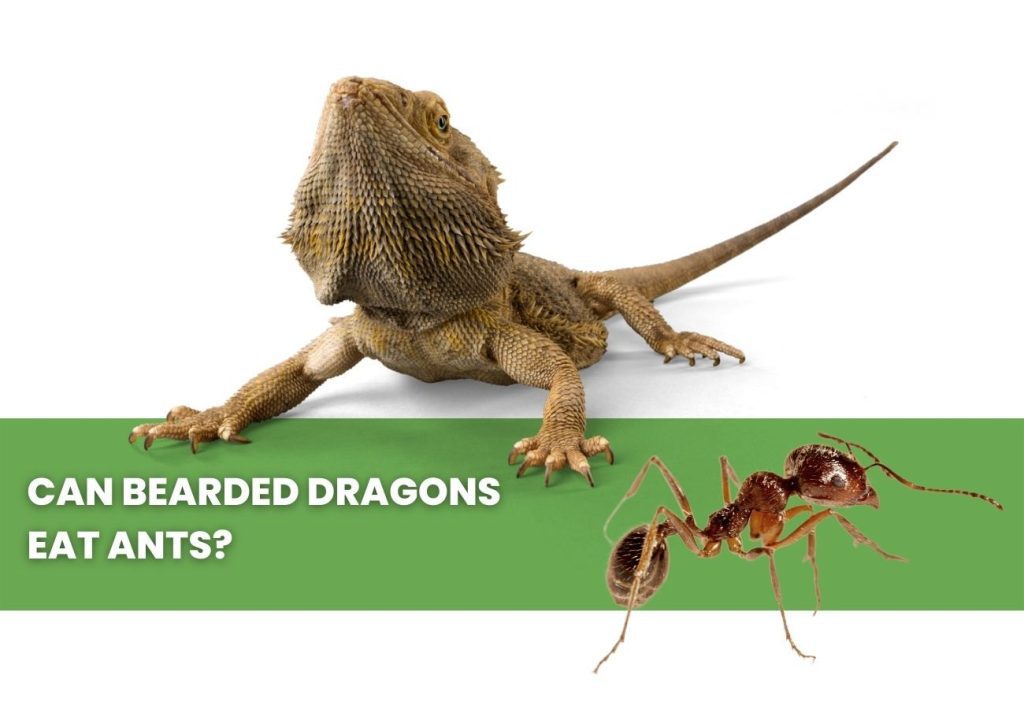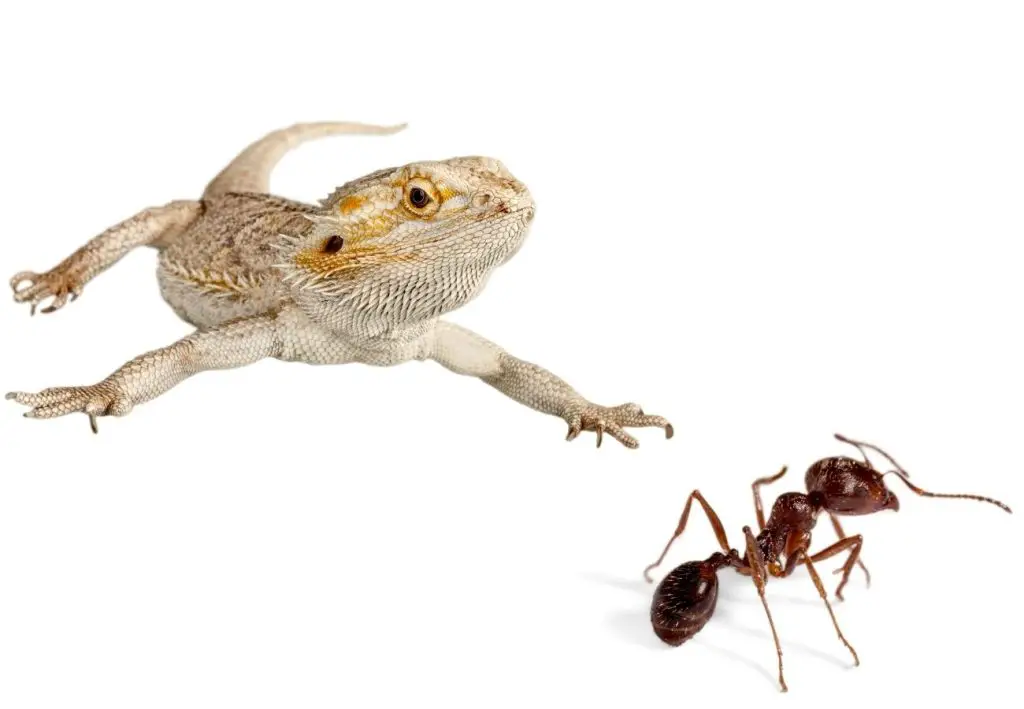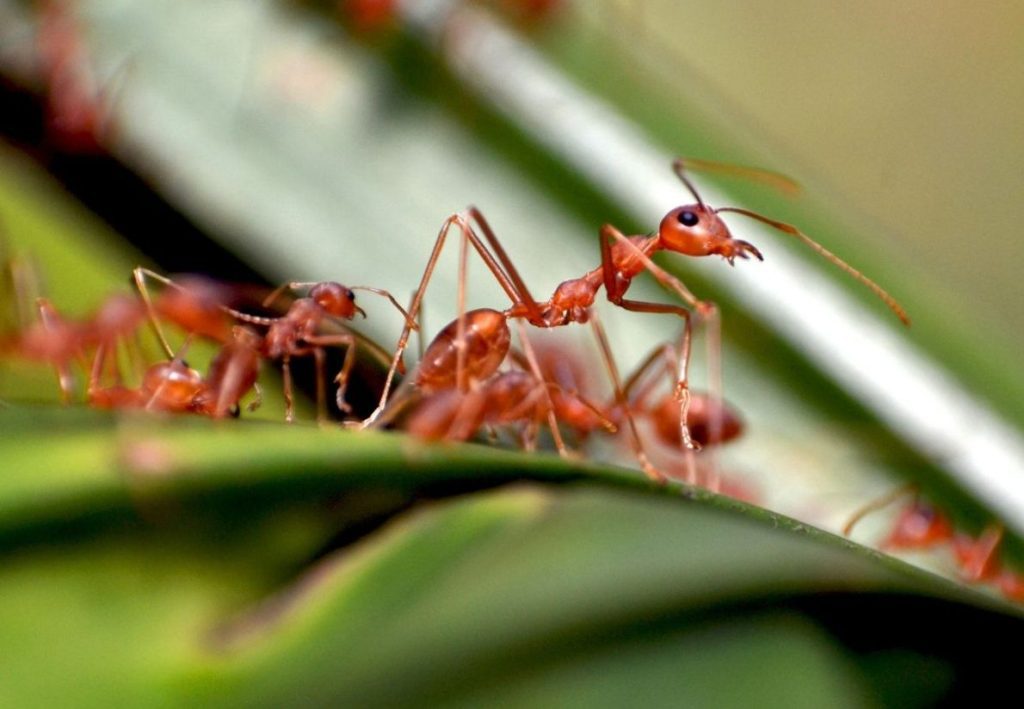
This article has been reviewed by veterinarian Sara Ochoa
Ants To Bearded Dragons – Toxic Or Not – The Verdict Is In
Bearded dragons can eat a variety of insects such as cockroaches, worms, and crickets. But not all insects are safe for them to eat.
As a bearded dragon owner, you might have wondered: Can bearded dragons eat ants?
The short answer is no. We do not recommend that bearded dragons eat ants. They are dangerous to your bearded dragon’s health, and in some instances, can be fatal.
This article will expose the nutritional value of ants and why they are dangerous for your bearded dragon.
Nutritional Content Of Ants
Table Indicating Nutritional Content Of Ants
| Nutrient Name | Amount |
| Phosphorus | 105.85 mg |
| Potassium | 46.37 mg |
| Calcium | 26.10 mg |
| Folic Acid | 0.451 mg |
| Magnesium | 10.93 mg |
From the above table, we can see that ants have nutrients that may or may not be suitable for bearded dragons. The main problem is that ants have low nutritional value.
Risks Of Ants In A Bearded Dragon’s Diet

Calcium
When choosing food for your bearded dragon, you should always consider the calcium to phosphorus ratio. Ants have a disproportionate ratio of calcium to phosphorus.
Although ants have a fair amount of calcium in their abdomen, it is far less than phosphorus.
Dragons’ bodies need calcium so much that if the amount becomes deficient, it starts pulling calcium from its bones, causing metabolic bone disease (MBD). Unfortunately, MBD is one of the most common diseases among domestic bearded dragons, but it is easily preventable with proper diet and care.
Phosphorus
From the table of nutrients, it is evident that ants contain high amounts of phosphorus in their abdomen, too much of which is not good.
Phosphorus binds with calcium and prevents the calcium from being absorbed by your bearded dragon. Low calcium levels can cause several health issues, of which the most common is metabolic bone disease (MBD).
Metabolic bone disease (also known as nutritional secondary hyperparathyroidism or fibrous osteodystrophy) refers to several painful skeletal disorders caused by a lack of calcium.
The disease causes severe bone, muscle, and tissue damage, resulting in paralysis or death.
Alert your vet immediately if you notice any signs of metabolic bone disease in your bearded dragon. These include:
- Lack of appetite
- Lethargy and weakness
- Stress
- Constipation
- Receded lower jaw
- Swollen limbs and jaw
- Bumps along the spine or bones
- Soft jaw, and facial bones
- Bowed limbs and arched spine
- Fractures and broken bones
- Greenstick fractures (folded or bent bones)
- Trembling and twitching limbs
- Tremors and seizures
- Paralysis or difficulty moving
Folic Acid
The primary defense system of ants against predators is folic acid. Insecticides
Ants may have insecticides or other chemicals in them that will adversely affect the health of your bearded dragon.
Biting
Ants bite and they will bite your bearded dragon. It is not likely that the ant will penetrate your bearded dragon’s tough skin, but it can still cause some irritation and discomfort.
If you notice any swelling on your bearded dragon’s skin, take him to the vet as soon as possible.
Possible Health Benefits With Ants

Potassium
Ants have a high amount of potassium. It is one of the essential minerals bearded dragons need. Potassium helps regulate fluids in a bearded dragon’s body Muscle contractions and nerve signals reduce blood pressure and other vital functions.
Protein
Ants have a high protein content. In every 100g of ants, there is 13.9g of protein.
Baby and juvenile bearded dragons need more protein and eat more insects to get protein for their speedy growth.
Can Baby Beardies eat Ants?
Baby bearded dragons are more susceptible to unsafe food than adult dragons and are more prone to health problems.
Avoid feeding ants to your baby bearded dragon. Feed your baby beardie proper nutrition such as live feeders and other foods.
What Is Folic Acid And Its Impact On Bearded Dragons?
Folic acid is a colorless liquid that has a penetrating and strong odor.
Most ant species spray folic acid to protect themselves against predators.
Folic acid repels the ant’s predators and poses a risk to bearded dragons. Beardies prefer eating live insects and are susceptible to these folic acid attacks.
Invasive Ant Species
Here is a list of common species of ants that can invade your property and harm your pet bearded dragon
- Acrobat ant
These ants are 3 mm long and have two nodes. Their colors vary: yellow-brown, red-black, or just entirely black. These ants are aggressive and will sting if they feel threatened. You can imagine the harm they can cause to your pet. These ants most commonly inhabit the Eastern United States.
- Argentine ant
This type of ant is smaller in size than acrobat ants, and its color is predominantly light or dark brown. Although these ants won’t sting, stepping on them will cause a strong smell that releases toxic chemicals.
- Asian Needle Ant
These ants can reach 5 mm in size, and they are either dark orange or dark brown. They are not that aggressive, but they will still sting sometimes. This type of ant is most common during the warm summer season.
- Carpenter Ant
Carpenter ants can be found all over the USA. You don’t want carpenter ants anywhere near you or your pet. Their length reaches 13 mm, and you will find them outside, building anthills, in your yard.
- Crazy Ant
These ants are not necessarily aggressive; they just move uncontrollably once their nest is disturbed. This type of ant forms large colonies in moisture and is likely to become food for your bearded dragon.
- Dark Rover Ant
Dark rover ants can be found under furniture, inside wall cracks, or parking lots. You can also find these ants near sweets.
- European Fire Ants
You can usually find fire ants in your garden. However, you must be careful because they have a potent sting. They release toxins that can seriously harm your bearded dragon.
- Field Ant
Field ants come in a variety of colors. Their most dangerous feature is; they can spray folic acid. You can find field ants anywhere near wood and greenery.
We are yet to discover many ant species such as black soldier ants and other ants.
How To Keep Ants Away From Bearded Dragon’s Enclosure?
Here are a few steps to guide you when you find ants in your bearded dragon’s enclosure.
Remove From Enclosure
Remove everything from the enclosure and wash with dish soap and water. The soap will get rid of ant scent trails. If ants have started to nest in your bearded dragon’s enclosure, you may have to soak the cage furniture and leaves outside for a few days.
Find The Origin
Once your cage is clean and ant-free; you need to figure out where the ants originated; otherwise, they will remain a problem.
Ants will find every hole in your wall: use a caulking gun and fill every crack and hole.
Pet Safe Ant Spray
Mix liquid soap, rubbing alcohol, and water in a spray bottle. Spray the mixture on the ant lines and wipe them away. It instantly kills ants and gets rid of their scent trail.
Bottom Line
To know what foods are safe to feed bearded dragons. Some food seems harmless and even highly nutritious but can prove harmful or fatal to a bearded dragon. We recommend that you do not feed ants to your bearded dragon.
Research any new food you wish to add to your bearded dragon’s diet. If unsure, contact your vet for advice.
Continue to read our main article “What do Bearded Dragons Eat?” for all the ins and outs on general diet questions, and get a further detailed breakdown of other popular foods in the articles below:
- Can Bearded Dragons eat tomatoes?
- Can Bearded Dragons eat oranges?
- Can Bearded Dragons eat parsley?
- Can Bearded Dragons eat blackberries?
- Can Bearded Dragons eat pumpkin?
- Can Bearded Dragons eat pineapple?
- Can Bearded Dragons eat cantaloupe?
- Can Bearded Dragons eat green beans?
- Can Bearded Dragons eat cherries?
- Can Bearded Dragons eat asparagus?
- Can Bearded Dragons eat mango?
- Can Bearded Dragons eat cauliflower?
- Can Bearded Dragons eat avocado?
- Can Bearded Dragons eat brussel-sprouts?
- Can Bearded Dragons eat collard-greens?
- Can Bearded Dragons eat wax-worms?
- Can Bearded Dragons eat dandelions?
- Can Bearded Dragons eat nightcrawlers?
- Can Bearded Dragons eat earthworms?
- Can Bearded Dragons eat eggs?
- Can Bearded Dragons eat basil?
- Can Bearded Dragons eat peaches?
- Can Bearded Dragons eat grasshoppers?
- Can Bearded Dragons eat sweet potato?
- Can Bearded Dragons eat hornworms?
- Can Bearded Dragons eat Mice?
- Can Bearded Dragons eat Cucumbers?
- Can Bearded Dragons eat Cabbage?
- Can Bearded Dragons eat Kale?
- Can Bearded Dragons eat Bell Peppers?
- Can Bearded Dragons eat Broccoli?
- Can Bearded Dragons eat Meat?
- Can Bearded Dragons Eat Green Onions?
